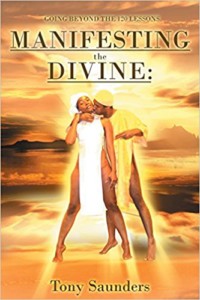Title: Manifesting the Divine: Going Beyond the 120 Lessons
Authors: Tony Saunders
Publisher: Toplink Publishing
ISBN: 978-1-946801-94-4
Pages: 387
Genre: Religion
Reviewed by: CC Thomas
Pacific Book Review
In Manifesting the Divine, author Tony Saunders presents a scholarly discussion focused on national and global events during the 1990s. Saunders, though, does not merely present his own understandings of this time in history nor does he simply present cold facts. Instead, the author anchors the discussion firmly in the “godbody” movement. In order to understand the book, readers will need to be familiar with this historical trend of thinking, started by a former member of the Nation of Islam. The members of this group propose they are in a small percentage who understands the truth of human existence. The “120 lessons” mentioned in the subtitle refers to lessons taught to the followers of the group.
Saunders proposes his book, Manifesting the Divine, goes beyond those 120 lessons and illustrates to readers how to use those lessons to lead a more fully understanding life in this tumultuous life of modernity. If readers are not already familiar with this movement and the ideas proposed, this will be a challenging read. Those who are already versed in this philosophy and background will likely find much to ponder.
Manifesting the Divine is not meant to be an introduction to this movement, nor to the lessons. Instead, Saunders assumes readers will be fully familiar with the background. This shouldn’t turn readers off. This book is one of those which causes you to put it down and turn to the web or other books for more information. While you won’t likely understand it without a solid foundation in the ideas of the Nation of Gods and Earths, it will create a curiosity which will need to be satisfied.
As a reader not familiar with the movement, there is still much worth for a casual look. Saunders proposes that understanding what occurred during this time period will help us in this modern world concerning the topic of racial tension. Reading the narrative timeline in the book gives a fresh perspective on how such turbulent racial divides have found root and have festered. While the book doesn’t suggest readers become followers of the movement, the author does suggest that understanding this particular type of historical belief, in connection with race relations, can be a healing balm, albeit a starting point on the long journey of racial acceptance and reconciliation.
Manifesting the Divine is more of an academic tome than a book to cozy up with by the fire. The ideas presented will keep the reader on his or her toes and will cause some thought-provoking inner reflections.



Follow Us